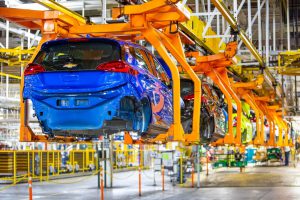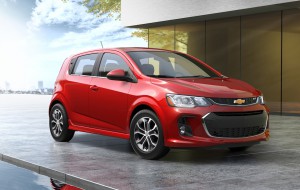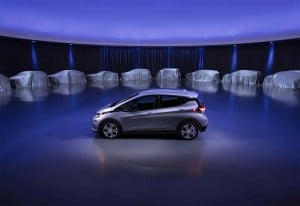Like a cat, the Chevrolet Sonic has survived a series of near-death experiences – but it has finally run out of lives, Chevy announcing it will drop the smallest passenger car in its line-up “due to declining demand.”
The imminent departure brings parent General Motors one step closer to abandoning sedans, coupes and hatchbacks entirely, following the move by cross-town rival Ford. Automakers, in general, are rapidly shifting resources to SUVs and CUVs, reflecting the move by American motorists.
The decision to drop Sonic, however, was apparently motivated by another factor, GM wanting to free up capacity at its Orion Township (Michigan) Assembly Plant to make room for more battery-car production. The factory currently builds the Chevy Bolt EV and will add an extended-length version, the Bolt EUV, next year. Other battery-electric vehicles, or BEVs, are set to follow at the big factory which has been working significantly below capacity due to declining small car demand.
(Chevy Sonic could be next as GM kills off slow-selling passenger cars.)
Originally known as the Chevrolet Aveo, the little hatchback was billed as a breakthrough for GM which, until its launch, struggled to make a business case for building small cars in the United States. With the help of concessions from the United Auto Workers Union, it was able to introduce the little car just as fuel prices started soaring. Renamed Sonic in 2012, when the Aveo went through a complete makeover, soaring demand appeared to justify GM’s costly move.

Chevrolet Bolt EV and Chevrolet Sonic vehicles are assembled on the same line at the Orion (MI) plant.
But sales didn’t hold up for long. Demand for the Chevy Sonic peaked at 93,518 in 2014, then started tumbling. They were down by more than two-thirds, to just 30,290, by 2017 and last year plunged to a mere 13,971. Even with the Bolt running alongside it on the Orion Township line, the factory was barely able to justify maintaining a single shift.
The demise of the Sonic came as little shock to industry observers. It dodged the bullet when, in 2018, GM said it would eliminate a range of products, primarily passenger cars, but its days were seen as numbered. There were numerous reports suggesting Sonic would be dropped last autumn. Chevy is finally making it official.
There has been some speculation Chevy could import a replacement, such as Onix model that has been a big hit in Latin America, but the bowtie brand currently says it has nothing in store for the North American market.
(GM planning to drop six passenger cars in product shake-up.)
That would surprise few observers considering what is happening across the automotive market. Ford has abandoned all U.S. passenger cars but for the distinctive Mustang. Fiat Chrysler is producing only a handful of muscle cars, such as the Dodge Challenger and Charger, and the big Chrysler 300, while importing some specialty models like the Alfa Romeo Giulia. GM itself has only a small range of offerings left after dropping products like the Chevrolet Cruze and Buick Regal.
Some import brands, such as Hyundai and Nissan, have pointedly said they’ll continue offering a broad range of sedans, coupes and hatchbacks – hoping to benefit as competitors drop out of the passenger car segment. But even among foreign marques, the trend is becoming apparent, Toyota, for one, recently announcing it would eliminate the familiar Yaris small car.
With the Sonic going away, GM’s suburban Detroit plant will be operating at a fraction of its capacity. GM had big aspirations for the Bolt when it was launched in 2017, but demand has fallen short of expectations. Only 23,297 of the small EV hatchbacks were sold in the first year, demand dropping to 18,020 in 2018, and 16,419 last year. Sales are down even more this year, though it is difficult to read trends amidst the noise of the coronavirus pandemic and the sharp overall decline in U.S. vehicle sales.
GM now is hoping that a stretched version of the Bolt will boost interest in the nameplate. But that alone won’t be enough to keep the Orion Township plant going, company insiders have told TheDetroitBureau.com.
(GM transforming Poletown plant into primary EV production site.)
The automaker is, if anything, investing more money to retool the plant as it moves forward with an aggressive electrification program planned to bring 20 new BEVs to market by 2023. Additional BEVs will go into Orion, with others moving into the Detroit-Hamtramck plant now undergoing a major update.


